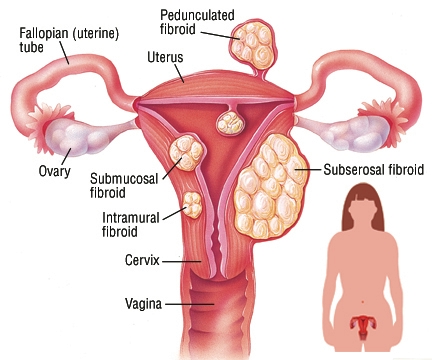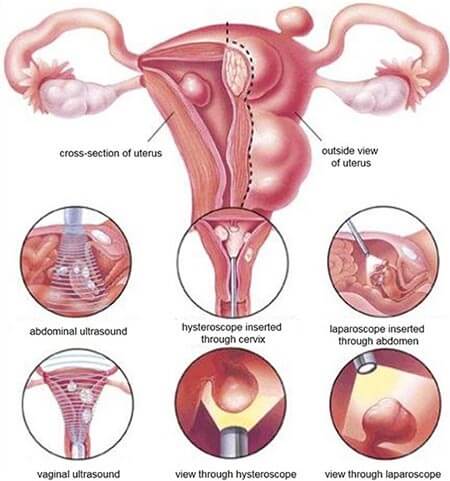What Are Uterine Fibroids?
 Uterine fibroids develop in the womb and are muscular tumors. They are usually benign, and less than one in 1000 will become cancerous. Having fibroids does not increase your risk of developing another form of cancer in the uterus. Fibroids are usually round, and although they consist of the same smooth muscle as the wall of the uterus, they are much denser. Uterine fibroids may develop singly, or you might have multiple tumors. They can be very small or might grow to become grapefruit sized.
Uterine fibroids develop in the womb and are muscular tumors. They are usually benign, and less than one in 1000 will become cancerous. Having fibroids does not increase your risk of developing another form of cancer in the uterus. Fibroids are usually round, and although they consist of the same smooth muscle as the wall of the uterus, they are much denser. Uterine fibroids may develop singly, or you might have multiple tumors. They can be very small or might grow to become grapefruit sized.
Who Gets Uterine Fibroids?
Uterine fibroids generally develop during the 30s, 40s, and through menopause but are most common amongst women in their 40s and early 50s. Genetics is another factor as if your mother or another close female relative had fibroids, your risk is approximately three times higher than average.
Overweight women are at higher risk, especially those who are very heavy. Your ethnicity also makes a difference, as African-American women are more at risk than white women. If you like to eat plenty of red meat and ham, you are more likely to get fibroids compared with a woman who eats lots of green vegetables, which seems to have a protective effect.
Do Uterine Fibroids Grow Fast?
Uterine fibroid growth can be stimulated by estrogen, so they might grow a little larger with each menstrual cycle. Fibroids that grow very rapidly may need to be closely monitored. There is a rare and cancerous form of fibroid that is a fast-growing tumor, but this develops in less than 1% of uterine fibroids. It’s not known for sure why some women develop uterine fibroids, and it’s thought several factors could influence a woman’s risk. One possibility is that the cause is hormonal and is affected by progesterone and estrogen levels. Uterine fibroids can grow more quickly during pregnancy as hormone levels increase. After menopause, when hormone levels decline, fibroids can shrink in size.
Where Are Uterine Fibroids?
Most uterine fibroids or uterine cysts develop in the wall of the uterus and are categorized as being submucosal, intramural, or subserosal. Submucosal fibroids develop in the uterine wall. Intramural fibroids develop within the wall of the uterus. Subserosal fibroids develop on the outside of the uterus. There is another type of fibroids called pedunculated fibroids, and which develop outwards from the uterus surface or they can grow into the uterus cavity. These can have an appearance almost like mushrooms.
Why Do Uterine Fibroids Cause Pain?
Often women with uterine fibroids will have no symptoms, but one of the most common signs is abnormal uterine bleeding. When the tumors interfere with the blood flow to the lining of the uterus, they can cause prolonged, painful, and heavy periods and women who bleed excessively may develop anemia. If uterine fibroids begin to degenerate, they can sometimes cause localized and severe pain. Other symptoms include pelvic pain, feeling pressure on the rectum or pressure on the bladder, or having a swollen uterus.
Patient Experience
Are Uterine Fibroids Dangerous During Pregnancy?
Fibroids will not interfere with ovulation, but it is suspected that they could affect fertility and may result in a poorer pregnancy outcome. Women with uterine fibroids are more likely to require a cesarean section, and there could be a risk of preterm delivery. Occasionally, fibroids can cause recurrent miscarriages and must be removed for a woman to have a successful pregnancy. If you have fibroids and want to become pregnant, it’s worth discussing the possible impact of uterine fibroids and pregnancy with your obstetrician.
When to Treat Uterine Fibroids?
Fibroids that do not cause any symptoms may not require any treatment but can simply be checked during your pelvic exams to monitor any changes in size. If your uterine fibroids are causing discomfort, then your doctor can discuss the best way to treat them. Uterine fibroids treatment prescribed will depend on the symptoms, the size, and location of the fibroids, whether you wish to become pregnant in the future, and your age, and how close you are to menopause.
When to Use Medications?
Mild symptoms can normally be treated with medications, including over-the-counter drugs such as acetaminophen and ibuprofen. If your fibroids cause heavy bleeding, you may need to take an iron supplement to counteract anemia. Some contraceptive pills can help control fibroid symptoms as for example, low-dose birth control pills can help control heavy bleeding. Other options include birth control injections or an intrauterine device (IUD) which releases a small amount of progesterone to control heavy bleeding.
A Lupron injection can help to shrink fibroids and is a gonadotrophin releasing hormone agonist. This fibroids treatment option may be useful in preparation for surgery to remove fibroids, and most women tolerate these injections very well, although it can produce side effects similar to menopause. Uterine fibroids may shrink by as much as 50%.
Why Remove Uterine Fibroids?
Generally, uterine fibroids can be left in place, but fast-growing fibroids may require removal. One risk of leaving uterine fibroids is that they can sometimes grow significantly, causing unpleasant symptoms and which will eventually require removal. When fibroids become larger, the surgery to remove them can be trickier and riskier.
What Is Uterine Fibroid Surgery?
Fibroids causing moderate or severe symptoms may be more effectively treated with surgery, and the technique used will depend on the size of the fibroids.
Laparoscopic Myomectomy
Laparoscopic myomectomy is minimally invasive, and this treatment is suitable for smaller fibroids, retaining the healthy tissue of the uterus. It is best for women who wish to have children, and you should still be able to become pregnant after laparoscopic myomectomy. However, you may need a cesarean section.
Hysteroscopic Myomectomy
 Hysteroscopic Myomectomy is a technique that can only be used if the fibroids are submucosal or are within or bulging into the uterine cavity. With this procedure, no incisions are needed as instead, a hysteroscope, which is a little like a small telescope, is inserted into the uterus through the cervix. A camera is attached to the hysteroscope, so the physician can see the areas requiring treatment. The hysteroscope has a thin wire attachment, and a small electrical current is used to cut through the fibroids. The instrument automatically seals blood vessels, so healing and recovery are faster.
Hysteroscopic Myomectomy is a technique that can only be used if the fibroids are submucosal or are within or bulging into the uterine cavity. With this procedure, no incisions are needed as instead, a hysteroscope, which is a little like a small telescope, is inserted into the uterus through the cervix. A camera is attached to the hysteroscope, so the physician can see the areas requiring treatment. The hysteroscope has a thin wire attachment, and a small electrical current is used to cut through the fibroids. The instrument automatically seals blood vessels, so healing and recovery are faster.
Myomectomy
A standard myomectomy is completed through a small incision in the abdominal wall. The extent of the surgery will depend on the size, location, and type of fibroids.
Hysterectomy
This surgery will remove the uterus, and uterine fibroids are one of the most common reasons for a hysterectomy. You may require a hysterectomy if you have very large fibroids or are near or past menopause and if you do not wish to add to your family. The technique used during a hysterectomy will depend on the size of the fibroids, but recovery is likely to take several weeks.
Do you have questions about Fibroids symptoms, diagnosis, or treatment plan? Would you like to schedule an appointment with the top gynecologists in Brooklyn Heights, NY please contact our Brooklyn GYN clinic. For more information for preventing fibroids, make an appointment at Brooklyn GYN Place gynecological clinic.
Brooklyn GYN Place
142 Joralemon Street, Suite 4CF
Brooklyn, NY 11201
(Brooklyn Heights)
718-624-0604
Would like to schedule an appointment with the top obgyn doctor in Downtown, Brooklyn, please contact our Brooklyn Heights office.
Our office has a 24/7 answering service to address
any Emergencies.
Disclaimer:
The information provided on this site is intended to educate the reader about certain medical conditions and certain possible treatment. It is not a substitute for examination, diagnosis, and medical care provided by a licensed and qualified health care professional. If you believe you, or someone you know suffers from the conditions described herein, please see your health care provider immediately. Do not attempt to treat yourself or anyone else without proper medical supervision.
- Our office has a 24/7 answering service to address any emergencies.
